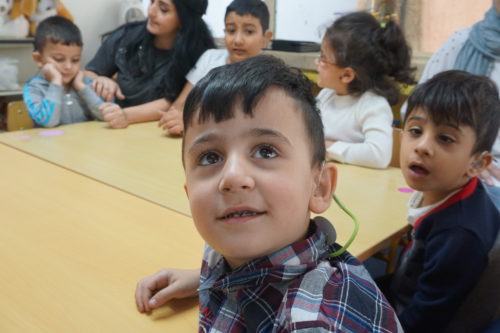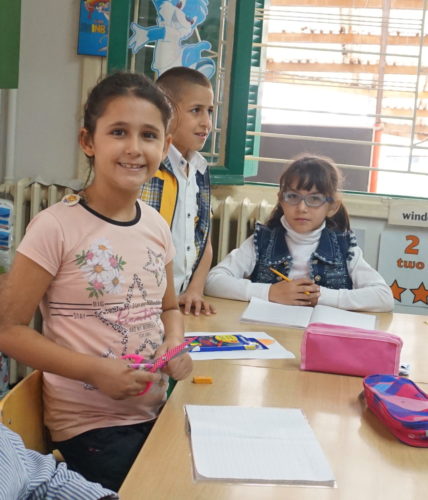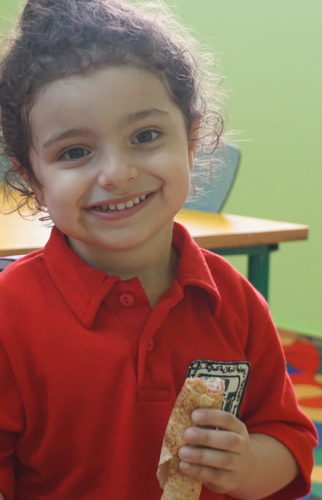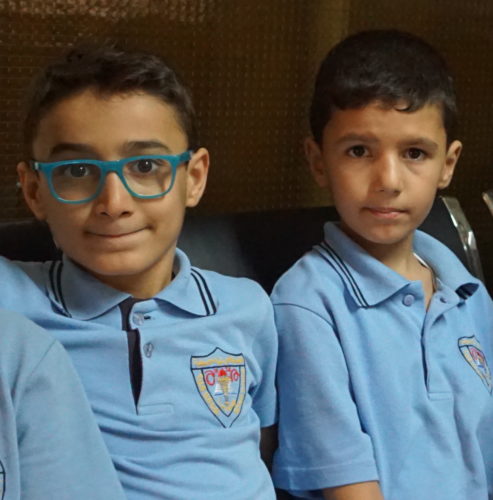The Father Andeweg Institute for the Deaf, or FAID, is one of the few schools in Lebanon that provide an education to hearing-impaired children. A long-time Children Incorporated affiliated project, FAID supports about 100 students every day, many of them refugee children from neighboring countries – primarily Syria.
FAID’s mission:
To act as a caring institute for the deaf and hard of hearing, which reflects a healthy balance of academic goals and building self-esteem, self-awareness, and life skills.
During a trip to Beirut, Lebanon, our Director of International Programs, Luis Bourdet, visited FAID and met with our Volunteer Coordinator Ms. Shawish. She explained to Luis that the most challenging aspect of her job is that the school receives less and less support from the Lebanese government each year. Yet every year, the need to help more and more children continues to increase. Currently, the school’s funding comes from various local and foreign partners, including Children Incorporated. Our sponsors help to support over sixty students at FAID alone.
A history of FAID
FAID was founded in 1957 by Anglican clergyman Reverend Dr. Arie J. Andeweg. Reverend Dr. Andeweg, known as “the father of deaf people in Lebanon,” first started his work in 1956 by meeting with deaf adults at local coffee houses in Beirut. He was soon able to communicate with them and decided to establish a club for the deaf so that they could meet on a regular basis. In 1957, with younger deaf children in mind, he founded FAID. Today, FAID is one of the most prominent education centers for the deaf in the Middle East.
A leading comprehensive center
FAID provides an education to children from preschool to high school, ages three through eighteen. There, they learn to develop language to support memory and learning, achieve their academic and vocational potential, develop tools for safety and confidence in the modern world, create happy memories of their childhood and lasting friendships, and have a place to be healthy and resilient both physically and emotionally.
While in attendance at the school, students learn the Lebanese national curriculum and sign language. They are provided with much-needed audiology services, including supplies of hearing aids, hearing aid batteries, and ear molds; hearing tests; and hearing aid maintenance. The children also attend speech therapy sessions twice a week; auditory training with methodologies for listening and learning to hear; and they receive psychological and emotional support.
Enabling kids to reach their full potential
While they were meeting, Ms. Shawish explained to Luis that the aim of FAID is for every child and young person that attends to develop into the best possible version of themselves. She stated that the earlier hearing loss occurs in a child’s life, the more serious the effects can be on the child’s development. Similarly, the earlier a problem is identified and intervention begins, the less serious the ultimate impact is likely to be.
While in attendance at the school, students learn the Lebanese national curriculum and sign language. They are provided with much-needed audiology services, including supplies of hearing aids, hearing aid batteries, and ear molds; hearing tests; and hearing aid maintenance.
As they toured the school and met with some of our sponsored children, Ms. Shawish told Luis that because of the special circumstances that the children are in — especially the older refugee children who attend the school — FAID has created group classes to meet the needs of the students who had never been to a specialized school.
The school also offers a theater class. Ms. Shawish feels that drama is an important tool for preparing students to live and work in a world that is increasingly team-oriented rather than hierarchical. Drama classes also help students develop tolerance and empathy.
Looking towards the future
Although having enough funding to provide for all the needs of the children is an issue, Ms. Shawish is confident that the school will continue to grow and add new programs. She talked with Luis about how FAID is piloting an outreach program among the Syrian refugee camps in Lebanon and the Lebanese community in order to raise awareness regarding deafness and the importance of education for those affected. Ms. Shawish is also hopeful that she will find a means to offer assistance to students who want to continue on to universities or technical schools once they graduate.
Before Luis left, Ms. Shawish assured him that without Children Incorporated’s support, the school, which is incredibly valuable to so many children, would not survive. She also mentioned that there are many deaf and hearing-impaired students at the school who could still use the help of a caring sponsor to ensure that they are equipped to fully participate in the world around them.
***
HOW DO I SPONSOR A CHILD IN LEBANON?
You can sponsor a child in Lebanon in one of three ways: call our office at 1-800-538-5381 and speak with one of our staff members; email us at sponsorship@children-inc.org; or go online to our sponsorship portal, create an account, and search for a child in Lebanon who is available for sponsorship.




